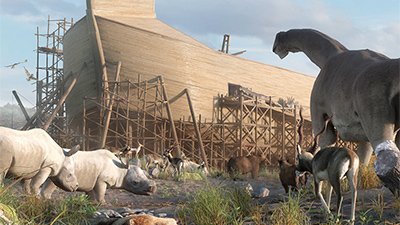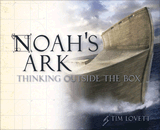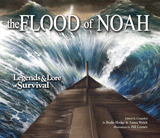What We Know of Noah and the Ark in the Bible
It is evident that the Ark did not resemble a bathtub toy, but was more like a modern-day cargo ship.
Noah’s Ark is one of the few “stories” that most people recognize, even those that have never stepped in a church or cracked open a Bible. The beloved child’s tale of the overstuffed bathtub toy filled with all sorts of lovable creatures has been a favorite of many. But, how does this story compare with the historical account that is recorded for us in the Bible? Do most of us really know what we know and don’t know about Noah, his family, his task, and the world in which he lived? With the release of the Noah movie, Paramount Pictures has presented their rendition of the historical global flood. In this article we will explore what information the Bible gives, what we do not know, and what everyone needs to know.
What We Know
The Bible, in Genesis 5–9, gives us the bulk of what we know about Noah and his life. Noah was married and had three sons: Shem, Ham, and Japheth. Each of the sons had his own wife. In the years Noah spent building the Ark, his grandfather Methuselah and father Lamech were alive and may have even assisted Noah in some ways. We are told that Noah walked with the Lord and found grace in His sight (Genesis 6:8–9; cf. Ezekiel 14:14, 20). We know from the genealogy listed in the previous chapter that Noah was in the tenth generation of the human race, and his name is related to “comfort
” and “rest
” (Genesis 5:29). In other writings he is also described as a “preacher of righteousness
” (2 Peter 2:5) who was motivated by faith and godly fear (Hebrews 11:7). This is not a lot of detail, but I would be ecstatic if that was how my life was summarized.
Beyond Noah’s family we have the rest of the people on the earth—all descendants of Adam and Eve. Once again we are not given a lot of detail, but a summary of their behavior is given in Genesis 6:5, “Then the Lord saw that the wickedness of man was great in the earth, and that every intent of the thoughts of his heart was only evil continually.
”
God entrusts the task of building the Ark to Noah and gives him the necessary information to complete the task—size, layout, and appropriate building materials (Genesis 6:13–16). Based on this information, it is evident that the Ark did not resemble a bathtub toy, but was more like a modern-day cargo ship.
Then there are the animals. Being a veterinarian, I am still surprised by how many people are drawn to the account of Noah because of the animals. Many people, even some who are not Christians, identify Noah as being the first veterinarian. God brought the animals to Noah, but Noah was given the task of collecting rations and providing for them while on the Ark. The Lord said to Noah,
And of every living thing of all flesh you shall bring two of every sort into the ark, to keep them alive with you; they shall be male and female. Of the birds after their kind, of animals after their kind, and of every creeping thing of the earth after its kind, two of every kind will come to you to keep them alive. And you shall take for yourself of all food that is eaten, and you shall gather it to yourself; and it shall be food for you and for them. (Genesis 6:19–21)
Many critics of the biblical account have claimed that the Ark could not hold all of the animals. The key to answering this charge is that Noah brought two of every kind, which we currently understand to be similar to the family level of our modern classification system. Research is currently being conducted to calculate the number of animals on the Ark and to get an idea of what they may have looked like, as is evidenced by these articles:
- Determining the Ark Kinds
- An Initial Estimate of Avian Ark Kinds
- Mammalian Ark Kinds
- An Initial Estimate toward Identifying and Numbering Extant Tuatara, Amphisbaena, and Snake Kinds
- An Initial Estimate toward Identifying and Numbering the Ark Turtle and Crocodile Kinds
- An Initial Estimate Toward Identifying and Numbering Amphibian Kinds within the Orders Caudata and Gymnophiona
- An Initial Estimate Toward Identifying and Numbering the Frog Kinds on the Ark: Order Anura
Noah was also instructed to bring seven (or seven pairs) of each kind of clean animal and bird. Some of these would become the animals Noah sacrificed to God after he left the Ark (Genesis 8:20). What it boils down to is that there was plenty of room on the Ark for everyone, including the dinosaurs.
Where did all of this take place? We know the Ark landed in the mountains of Ararat (Genesis 8:4), but we cannot know where the Ark was built since that world was destroyed (2 Peter 3:6). Throughout biblical history, it appears that people hesitated to move and spread out as God commanded (Genesis 9:1). For example, the Tower of Babel and the early church in Acts are both points in time where major outside forces like confounding the language or government persecution forced people to scatter.
Finally, there is the question of when these things took place. Utilizing the genealogies in the Bible we know the flood was close to 4,400 years ago, roughly 1,650 years after the creation. Noah was 600 when the Flood came (Genesis 7:6). From Scripture we know the date of the start of the Flood (Genesis 7:11) and when they left the Ark (Genesis 8:14–15), so we know they were on the Ark for a little over a year. Other than caring for the animals, which I can attest to being a full-time job, we do not know how they spent their time on the Ark.
What We Do Not Know
In some ways it seems that there is a lot more that we don’t know about these events than what we do know. This can be intriguing, frustrating, and exciting all at the same time. The Gospel of John closes by stating, “And there are also many other things that Jesus did, which if they were written one by one, I suppose that even the world itself could not contain the books that would be written. Amen
” (John 21:25). If so much could have been written about the years of Christ’s ministry, it should comfort us that God hand-picked the most important information throughout history to give us in His Word.
We do not know what Noah did prior to constructing the Ark. Building a ship requires a totally different skill set than growing a vineyard, which He did after the Flood (Genesis 9:20), and there is no indication that Noah did anything like this previous to his commissioning. Noah’s wife is often referred to as Mrs. Noah because she is never named, as is also the case with Noah’s daughters-in-law. Did people outside of Noah’s family help him build the Ark? There is nothing in the Bible that says either way. Neither does it tell us if people made fun of Noah for his faith in God and for undertaking the Ark project. This makes sense knowing how this world ridicules God’s followers, but to say that happened to Noah is speculation.
From a more technical standpoint, we are not sure if it rained prior to the Flood, but most likely it did. We know it did not rain during the Creation Week (Genesis 2:5), but it does not specify if that situation continued, and we do not have a scientific model for a pre-Flood environment that works without the current moisture cycle. We also believe that there were not as many phenotypes or physical species of animals, though each animal kind likely contained great genetic diversity. But we do not know what exactly these representative kinds looked like.
What Everyone Needs to Know
So not knowing everything is not the end of the world. We know that any movie or other history-based drama is necessarily going to take some creative license—giving Mrs. Noah a first name, for instance. What is more important is that we must be able to differentiate between what the Bible states and what is creative license, and identify points that may alter God’s message.
It is God’s message that everyone should know when they walk away from Noah’s account. The message that God is the Creator, that sin has consequences, and judgment is coming. The people of Noah’s time lived how they wanted to live up until the Flood took them. They never took the time to repent of their wickedness.
It is interesting that the Bible tells us there was only one door to the Ark (Genesis 6:16). Similarly, there is only one way to enter into a relationship with God. Jesus said, “I am the way, the truth, and the life. No one comes to the Father except through Me
” (John 14:6). For those who believe in Him, Jesus is our one entrance into God’s redemptive grace.
The Bible warns us that a second judgment is coming—this time by fire (2 Peter 3:7). People are turning from God, rejecting Him as Creator, and putting themselves in His place. God continues to be longsuffering, as He was in Noah’s day, but there will come a time when judgment will come. During Noah’s time the question was, “Were you standing in the boat or standing out in the world?” There was no hope of survival for the people outside of the Ark, God’s means of physical salvation. In Noah’s day grace came in the shape of an Ark. Today grace comes in the shape of a Cross. The only way a person can be saved from the eternal consequences of their rebellion against God is to turn from that sin and trust in the Savior Jesus Christ—the way, the truth, and the life. Where do you stand?
Recommended Resources

Answers in Genesis is an apologetics ministry, dedicated to helping Christians defend their faith and proclaim the good news of Jesus Christ.
- Customer Service 800.778.3390
- © 2025 Answers in Genesis








